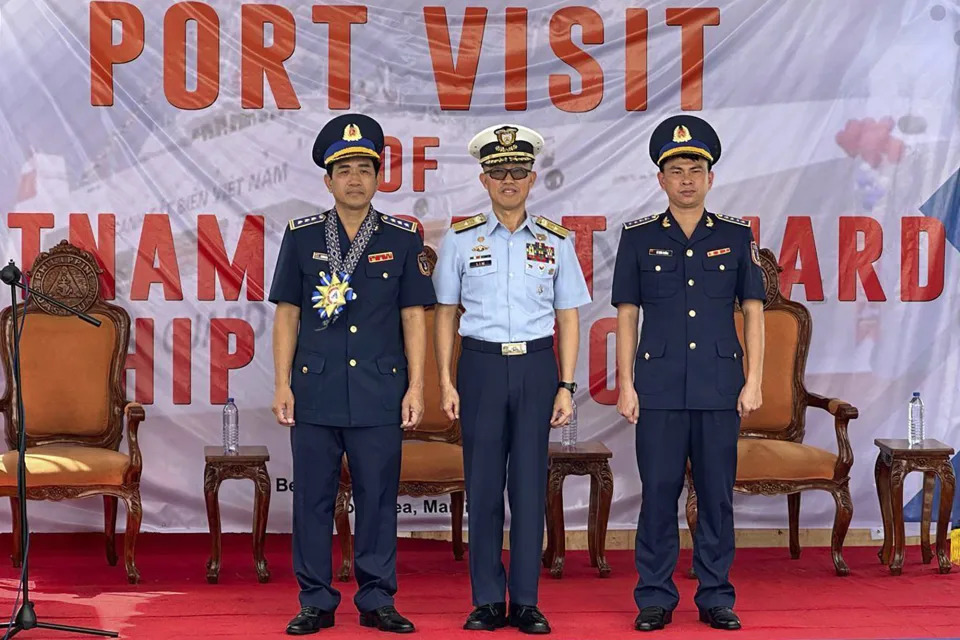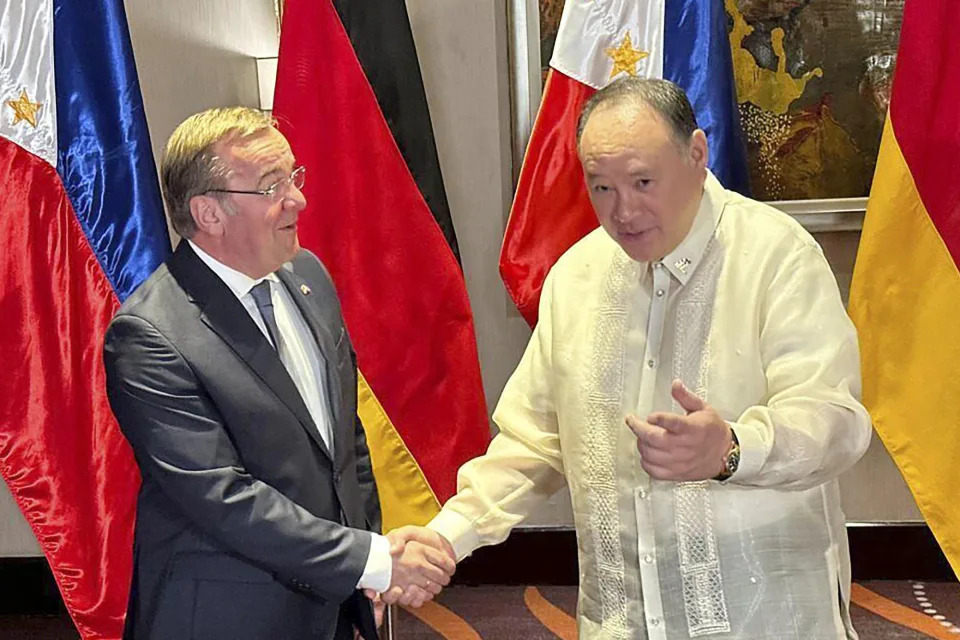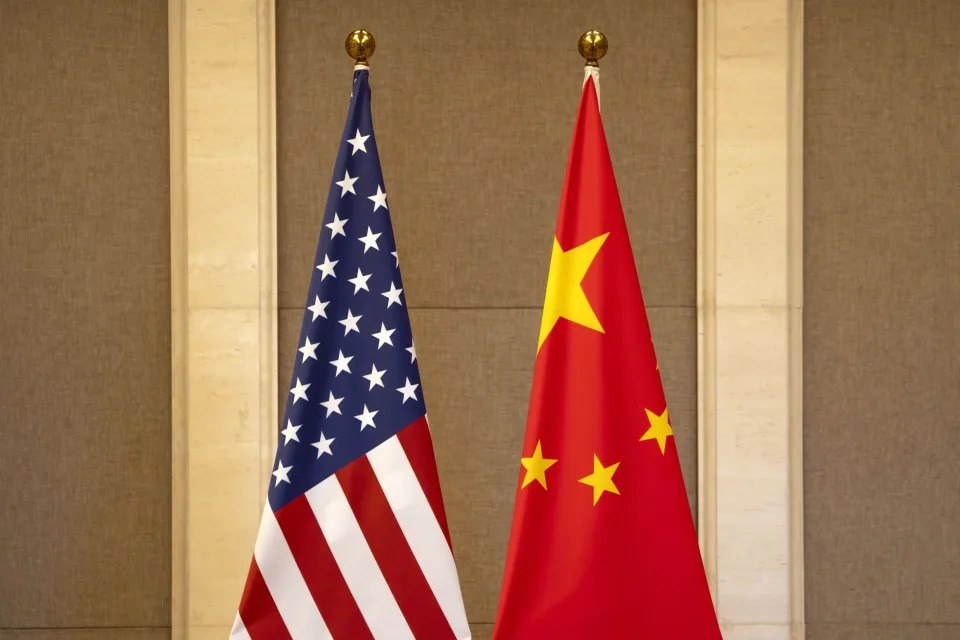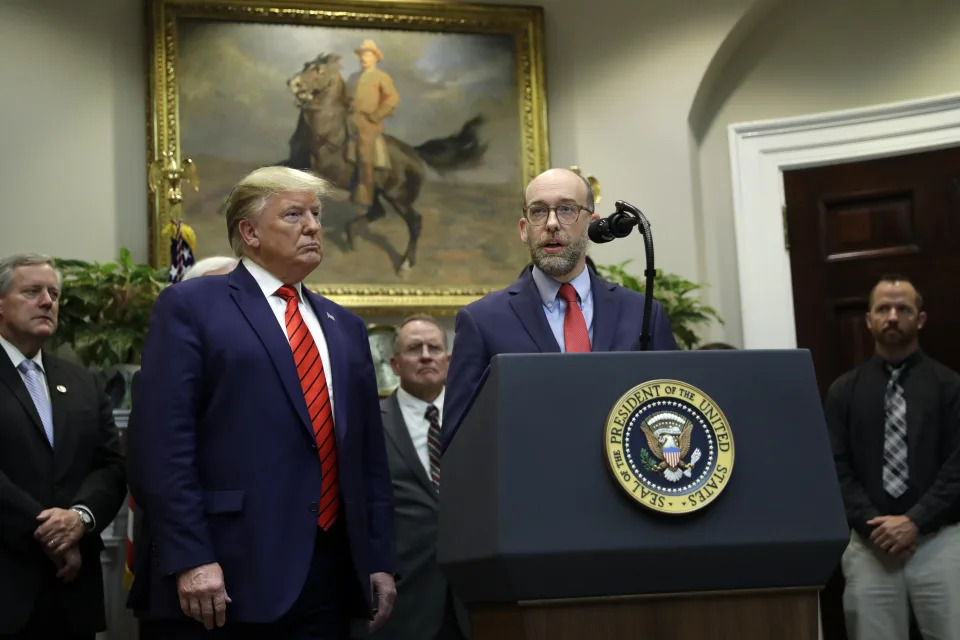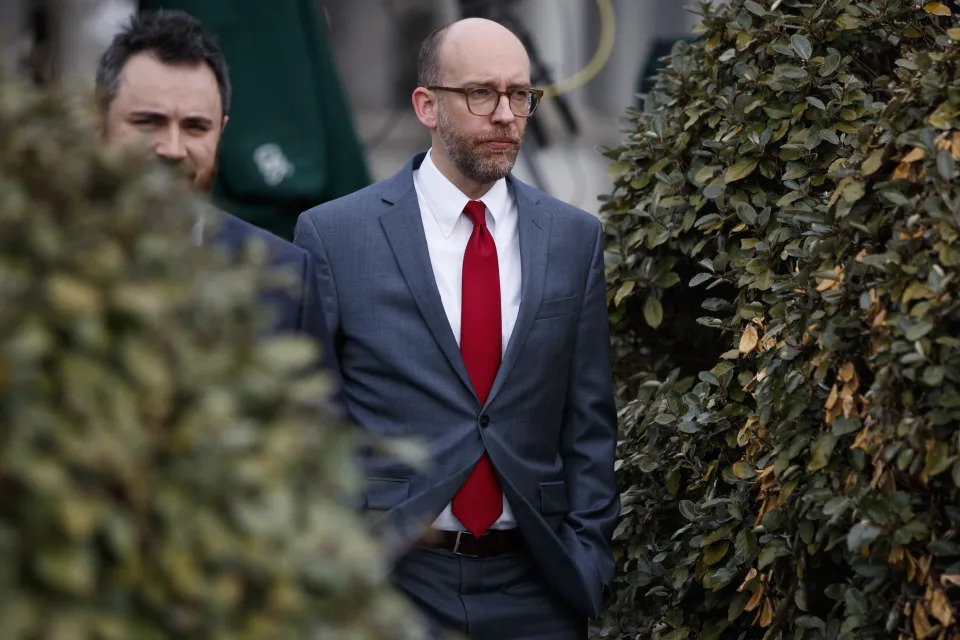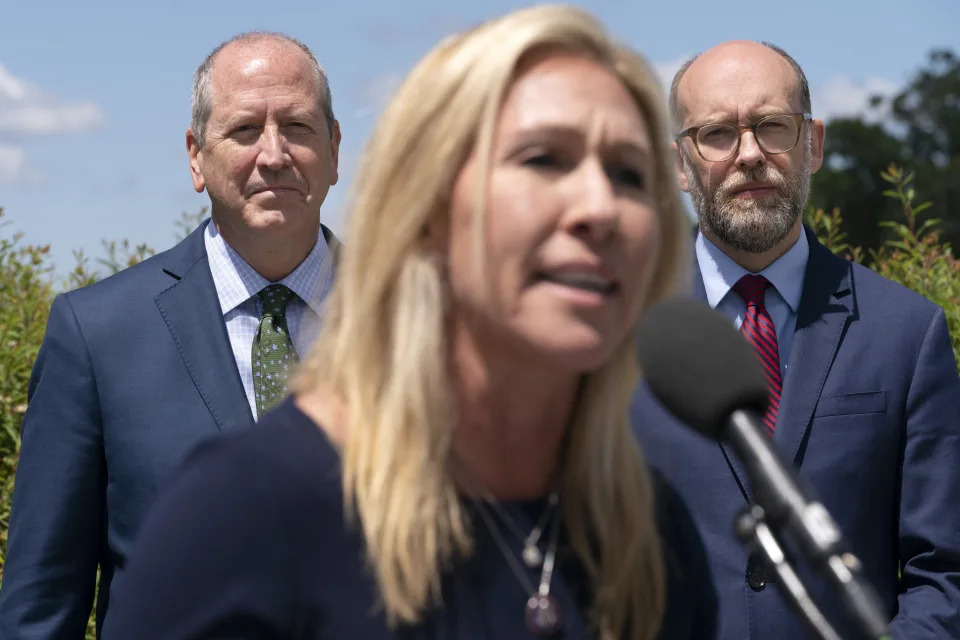Bangladesh Protests Become ‘People’s Uprising’ Against Government
Charlie Campbell
Charlie Campbell
TIME
Mon, August 5, 2024
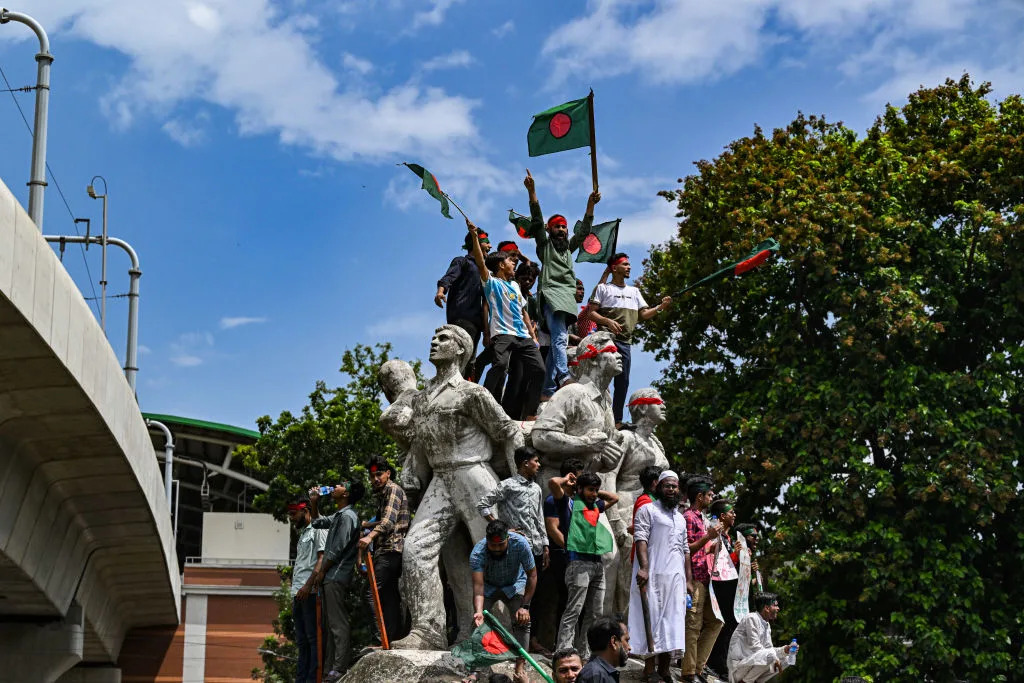
Protesters wave national flags as they stand over the Anti Terrorism Raju Memorial Sculpture during a protest in Dhaka on Aug. 4, 2024, to demand justice for the victims arrested and killed in the recent nationwide violence.
Mon, August 5, 2024

Protesters wave national flags as they stand over the Anti Terrorism Raju Memorial Sculpture during a protest in Dhaka on Aug. 4, 2024, to demand justice for the victims arrested and killed in the recent nationwide violence.
Credit - Zabed Hasnain Chowdhury—NurPhoto/Getty Images
Spiraling clashes between police and anti-government protesters in Bangladesh resulted in at least 90 deaths on Sunday, as initially peaceful student demonstrations morphed into a nationwide campaign of civil disobedience aimed at unseating autocratic Prime Minister Sheikh Hasina.
Read More: Sheikh Hasina and the Future of Democracy in Bangladesh
Despite the government once again cutting mobile internet nationwide, hundreds of thousands of protesters took to the street over the weekend with calls to march on the Ganabhaban, the prime minister’s official residence in the capital Dhaka, on Monday afternoon. In response, police set up roadblocks at major arteries into the city, but students say thousands have already slipped past the security cordon in order to join the demonstrations. “The time has come for the final protest,” said Asif Mahmud, a protest leader, per AFP.
Hasina has so far been characteristically defiant. Speaking following a meeting with security chiefs, she said demonstrators were “not students but terrorists who are out to destabilize the nation.” Still, such is the scale and breadth of public anger that analysts doubt whether her ruling Awami League party—which was returned for a fourth straight term in January elections boycotted by the opposition and denounced by observers as neither free nor fair—could possibly stay in power.
“Survival of the government is highly unlikely,” says Ali Riaz, a Bangladeshi-American political scientist and professor at Illinois State University. “I don’t think that people will go back without seeing a transition.”
It’s chaos largely of Hasina’s own making after the Awami League-aligned students’ group, the thuggish Chhatra League, was dispatched to confront initially peaceful demonstrations that began last month against civil service employment quotas for descendants of the nation’s 1971 war of independence. Following a brutal crackdown by security forces, which have officially led to over 280 deaths to date though diplomatic sources tell TIME could in truth number over 1,000, the government imposed a nationwide curfew and all internet services were severed across South Asia’s second biggest economy of over 170 million people.
Read More: How Mass Protests Challenge Bangladesh’s Past—and Threaten to Rewrite Its Future
After order was briefly restored, police arrested thousands of students and opposition activists. But the resumption of internet connectivity resulted in a deluge of cellphone footage of beatings and killings being uploaded to social media, galvanizing protesters to escalate their demands by urging for a complete shutdown of all factories and public transport and for people to refuse to pay taxes or utility bills. In addition, they called on the 10 million or so of their compatriots based overseas to halt remittances worth an estimated $2 billion annually.
Outrage was particularly stoked by UNICEF reports that at least 32 children had been killed during the demonstrations, many shot inside their homes by security forces and Awami League-aligned militias allegedly firing indiscriminately at windows. Bangladeshi society has become largely inured to shadowy disappearances, with almost 2,500 extrajudicial killings reported between 2009-2022, but the brazen slaughter of civilians in broad daylight against a backdrop of economic doldrums and widespread alleged corruption has proven impossible to ignore. Sheikh Hasina’s blundering response to the bloodshed didn’t help after she was filmed crying over damage to a train station while deriding fallen students as “traitors” and “terrorists.”
On Sunday, the U.N.’s human rights chief, Volker Türk, called for an end to the “shocking violence” and urged the government to “cease targeting those participating peacefully in the protest movement, immediately release those arbitrarily detained, restore full internet access, and create conditions for meaningful dialogue.”
Yet unrest continues across the country, with thousands protesting in the southern city of Cox’s Bazar, while 13 police officers were killed when a mob attacked a police station in the district of Sirajganj north of Dhaka. A defining feature of the current tumult is the broad swath of society now on the streets, most tellingly a sizable female contingent in what remains a largely conservative and patriarchal Muslim society. Young people spray paint slogans denouncing Hasina or brandish placards calling her a “killer,” while statues of her once-revered father, independence hero Sheikh Mujibur Rahman, have been vandalized.
Read More: 5 Takeaways from TIME’s Interview with Bangladesh Prime Minister Sheikh Hasina
“Sheikh Hasina ruled by fear and that was the core element keeping her whole edifice of power intact,” says Mubashar Hasan, a Bangladeshi scholar at the University of Oslo in Norway. “But it has now come to a point where people have said, ‘Enough is enough.’ It’s not a protest anymore; it’s a people’s uprising.”
Whether Hasina can ride out the storm may depend on if Bangladesh’s military feels compelled to intervene. On Sunday, army chief General Waker-uz-Zaman said the armed forces “always stood by the people,” while his influential predecessor, General Ikbal Karim Bhuiyan, denounced “egregious killings” and called on Hasina to withdraw troops from the streets. While early reports blamed security forces including police and the feared Border Guard Force for deaths, multiple reports of more recent clashes suggest soldiers firing on Awami League-aligned militias in defense of protesters.
“For the military, an important factor is how India and the international community, including the U.N., will react,” says Riaz. “It would rather wait until it becomes the only option to the political forces and the public at large.”
The sheer scale of unrest means that, regardless of what happens next, Bangladesh faces an almighty reckoning. All 167 universities across the country have been shuttered indefinitely and faculty worry how anti-government protesters can once again mix harmoniously with their influential Chhatra League peers. But parallel schisms exist across society as the Awami League’s politicization of the police, courts, and practically every government institution have entrenched deep distrust of all organs of state. Even journalists for state-aligned media have been attacked by protesters enraged by the perceived bias of their reporting.
“Moving forward there needs to be a serious reconciliation process,” says Hasan. “Otherwise this country will fall into an abyss.”
Write to Charlie Campbell at charlie.campbell@time.com.
Spiraling clashes between police and anti-government protesters in Bangladesh resulted in at least 90 deaths on Sunday, as initially peaceful student demonstrations morphed into a nationwide campaign of civil disobedience aimed at unseating autocratic Prime Minister Sheikh Hasina.
Read More: Sheikh Hasina and the Future of Democracy in Bangladesh
Despite the government once again cutting mobile internet nationwide, hundreds of thousands of protesters took to the street over the weekend with calls to march on the Ganabhaban, the prime minister’s official residence in the capital Dhaka, on Monday afternoon. In response, police set up roadblocks at major arteries into the city, but students say thousands have already slipped past the security cordon in order to join the demonstrations. “The time has come for the final protest,” said Asif Mahmud, a protest leader, per AFP.
Hasina has so far been characteristically defiant. Speaking following a meeting with security chiefs, she said demonstrators were “not students but terrorists who are out to destabilize the nation.” Still, such is the scale and breadth of public anger that analysts doubt whether her ruling Awami League party—which was returned for a fourth straight term in January elections boycotted by the opposition and denounced by observers as neither free nor fair—could possibly stay in power.
“Survival of the government is highly unlikely,” says Ali Riaz, a Bangladeshi-American political scientist and professor at Illinois State University. “I don’t think that people will go back without seeing a transition.”
It’s chaos largely of Hasina’s own making after the Awami League-aligned students’ group, the thuggish Chhatra League, was dispatched to confront initially peaceful demonstrations that began last month against civil service employment quotas for descendants of the nation’s 1971 war of independence. Following a brutal crackdown by security forces, which have officially led to over 280 deaths to date though diplomatic sources tell TIME could in truth number over 1,000, the government imposed a nationwide curfew and all internet services were severed across South Asia’s second biggest economy of over 170 million people.
Read More: How Mass Protests Challenge Bangladesh’s Past—and Threaten to Rewrite Its Future
After order was briefly restored, police arrested thousands of students and opposition activists. But the resumption of internet connectivity resulted in a deluge of cellphone footage of beatings and killings being uploaded to social media, galvanizing protesters to escalate their demands by urging for a complete shutdown of all factories and public transport and for people to refuse to pay taxes or utility bills. In addition, they called on the 10 million or so of their compatriots based overseas to halt remittances worth an estimated $2 billion annually.
Outrage was particularly stoked by UNICEF reports that at least 32 children had been killed during the demonstrations, many shot inside their homes by security forces and Awami League-aligned militias allegedly firing indiscriminately at windows. Bangladeshi society has become largely inured to shadowy disappearances, with almost 2,500 extrajudicial killings reported between 2009-2022, but the brazen slaughter of civilians in broad daylight against a backdrop of economic doldrums and widespread alleged corruption has proven impossible to ignore. Sheikh Hasina’s blundering response to the bloodshed didn’t help after she was filmed crying over damage to a train station while deriding fallen students as “traitors” and “terrorists.”
On Sunday, the U.N.’s human rights chief, Volker Türk, called for an end to the “shocking violence” and urged the government to “cease targeting those participating peacefully in the protest movement, immediately release those arbitrarily detained, restore full internet access, and create conditions for meaningful dialogue.”
Yet unrest continues across the country, with thousands protesting in the southern city of Cox’s Bazar, while 13 police officers were killed when a mob attacked a police station in the district of Sirajganj north of Dhaka. A defining feature of the current tumult is the broad swath of society now on the streets, most tellingly a sizable female contingent in what remains a largely conservative and patriarchal Muslim society. Young people spray paint slogans denouncing Hasina or brandish placards calling her a “killer,” while statues of her once-revered father, independence hero Sheikh Mujibur Rahman, have been vandalized.
Read More: 5 Takeaways from TIME’s Interview with Bangladesh Prime Minister Sheikh Hasina
“Sheikh Hasina ruled by fear and that was the core element keeping her whole edifice of power intact,” says Mubashar Hasan, a Bangladeshi scholar at the University of Oslo in Norway. “But it has now come to a point where people have said, ‘Enough is enough.’ It’s not a protest anymore; it’s a people’s uprising.”
Whether Hasina can ride out the storm may depend on if Bangladesh’s military feels compelled to intervene. On Sunday, army chief General Waker-uz-Zaman said the armed forces “always stood by the people,” while his influential predecessor, General Ikbal Karim Bhuiyan, denounced “egregious killings” and called on Hasina to withdraw troops from the streets. While early reports blamed security forces including police and the feared Border Guard Force for deaths, multiple reports of more recent clashes suggest soldiers firing on Awami League-aligned militias in defense of protesters.
“For the military, an important factor is how India and the international community, including the U.N., will react,” says Riaz. “It would rather wait until it becomes the only option to the political forces and the public at large.”
The sheer scale of unrest means that, regardless of what happens next, Bangladesh faces an almighty reckoning. All 167 universities across the country have been shuttered indefinitely and faculty worry how anti-government protesters can once again mix harmoniously with their influential Chhatra League peers. But parallel schisms exist across society as the Awami League’s politicization of the police, courts, and practically every government institution have entrenched deep distrust of all organs of state. Even journalists for state-aligned media have been attacked by protesters enraged by the perceived bias of their reporting.
“Moving forward there needs to be a serious reconciliation process,” says Hasan. “Otherwise this country will fall into an abyss.”
Write to Charlie Campbell at charlie.campbell@time.com.
Why are there protests in Bangladesh again?
Mon, August 5, 2024
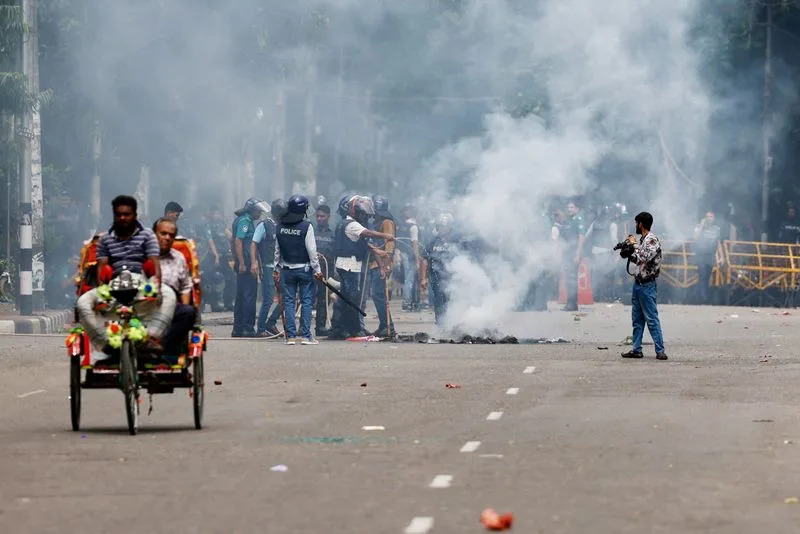
Protest against Bangladeshi PM Hasina, in Dhaka
By Sudipto Ganguly
(Reuters) -Bangladesh is on the boil again with close to 100 people killed on Sunday as protesters, calling for Prime Minister Sheikh Hasina's resignation, clashed with security forces and supporters of the ruling party.
Last month, at least 150 people were killed and thousands injured in violence touched off by student groups protesting against reserved quotas in government jobs.
Here are details of the new protests and their history:
CALLS FOR HASINA TO STEP DOWN
The 'Students Against Discrimination' group, which was at the forefront of last month's job quota protests, is leading the latest demonstrations.
The protests to reform the quota system paused after the Supreme Court scrapped most quotas on July 21. Protesters, however, returned last week demanding a public apology from Hasina for the violence, restoration of internet connections, reopening of college and university campuses and release of those arrested.
By the weekend, the demonstrations spiralled into a campaign seeking Hasina's ouster as demonstrators demanded justice for people killed last month.
The students' group called for a nationwide non-cooperation movement starting Sunday with a single-point agenda - Hasina must resign.
WHY DO PROTESTERS WANT HASINA'S RESIGNATION?
The protesters blame Hasina's government for the violence during the protests in July. Hasina's critics and rights groups have accused her government of using excessive force against protesters, a charge the government denies.
WHAT HAS HASINA SAID RECENTLY?
Hasina, 76, and her government initially said students were not involved in the violence during the quota protests and blamed the Islamic party, Jamaat-e-Islami, and the main opposition Bangladesh Nationalist Party (BNP) for the clashes and arson.
But after violence erupted again on Sunday, Hasina said that "those who are carrying out violence are not students but terrorists who are out to destabilise the nation".
The students group has declined Hasina's offer for talks to resolve the crisis.
WHAT TRIGGERED THE JOB-QUOTA PROTESTS?
Demonstrations started at university campuses in June after the High Court reinstated a quota system for government jobs, overturning a 2018 decision by Hasina's government to scrap it.
The Supreme Court suspended the high court order after the government's appeal and then dismissed the lower court order last month, directing that 93% of jobs should be open to candidates on merit.
FLAGGING ECONOMY, UNEMPLOYMENT
Experts also attribute the current unrest in Bangladesh to stagnant job growth in the private sector, making public sector jobs, with their accompanying regular wage hikes and privileges, very attractive.
The quotas sparked anger among students grappling with high youth unemployment, as nearly 32 million young people are out of work or education in a population of 170 million.
The flagging economy, once among the world's fastest growing on the back of the country's booming garments sector, has stagnated. Inflation hovers around 10% per annum and dollar reserves are shrinking.
HASINA WINS JANUARY ELECTION
Hasina retained power for a fourth straight term in a January general election boycotted by BNP, which accused her Awami League of trying to legitimise sham elections.
BNP said 10 million party workers were on the run ahead of the election with nearly 25,000 arrested following deadly anti-government protests on Oct. 28. Hasina blamed the BNP for instigating anti-government protests that rocked Dhaka ahead of the election and left at least 10 people dead.
(Reporting by Sudipto Ganguly in Mumbai; Editing by YP Rajesh and Raju Gopalakrishnan)
Mon, August 5, 2024

Protest against Bangladeshi PM Hasina, in Dhaka
By Sudipto Ganguly
(Reuters) -Bangladesh is on the boil again with close to 100 people killed on Sunday as protesters, calling for Prime Minister Sheikh Hasina's resignation, clashed with security forces and supporters of the ruling party.
Last month, at least 150 people were killed and thousands injured in violence touched off by student groups protesting against reserved quotas in government jobs.
Here are details of the new protests and their history:
CALLS FOR HASINA TO STEP DOWN
The 'Students Against Discrimination' group, which was at the forefront of last month's job quota protests, is leading the latest demonstrations.
The protests to reform the quota system paused after the Supreme Court scrapped most quotas on July 21. Protesters, however, returned last week demanding a public apology from Hasina for the violence, restoration of internet connections, reopening of college and university campuses and release of those arrested.
By the weekend, the demonstrations spiralled into a campaign seeking Hasina's ouster as demonstrators demanded justice for people killed last month.
The students' group called for a nationwide non-cooperation movement starting Sunday with a single-point agenda - Hasina must resign.
WHY DO PROTESTERS WANT HASINA'S RESIGNATION?
The protesters blame Hasina's government for the violence during the protests in July. Hasina's critics and rights groups have accused her government of using excessive force against protesters, a charge the government denies.
WHAT HAS HASINA SAID RECENTLY?
Hasina, 76, and her government initially said students were not involved in the violence during the quota protests and blamed the Islamic party, Jamaat-e-Islami, and the main opposition Bangladesh Nationalist Party (BNP) for the clashes and arson.
But after violence erupted again on Sunday, Hasina said that "those who are carrying out violence are not students but terrorists who are out to destabilise the nation".
The students group has declined Hasina's offer for talks to resolve the crisis.
WHAT TRIGGERED THE JOB-QUOTA PROTESTS?
Demonstrations started at university campuses in June after the High Court reinstated a quota system for government jobs, overturning a 2018 decision by Hasina's government to scrap it.
The Supreme Court suspended the high court order after the government's appeal and then dismissed the lower court order last month, directing that 93% of jobs should be open to candidates on merit.
FLAGGING ECONOMY, UNEMPLOYMENT
Experts also attribute the current unrest in Bangladesh to stagnant job growth in the private sector, making public sector jobs, with their accompanying regular wage hikes and privileges, very attractive.
The quotas sparked anger among students grappling with high youth unemployment, as nearly 32 million young people are out of work or education in a population of 170 million.
The flagging economy, once among the world's fastest growing on the back of the country's booming garments sector, has stagnated. Inflation hovers around 10% per annum and dollar reserves are shrinking.
HASINA WINS JANUARY ELECTION
Hasina retained power for a fourth straight term in a January general election boycotted by BNP, which accused her Awami League of trying to legitimise sham elections.
BNP said 10 million party workers were on the run ahead of the election with nearly 25,000 arrested following deadly anti-government protests on Oct. 28. Hasina blamed the BNP for instigating anti-government protests that rocked Dhaka ahead of the election and left at least 10 people dead.
(Reporting by Sudipto Ganguly in Mumbai; Editing by YP Rajesh and Raju Gopalakrishnan)
Bangladesh shuts internet as 90 killed in protests
Anbarasan Ethirajan - BBC News
Mon, August 5, 2024
Bangladesh has ordered a second internet blackout in three weeks after a new round of anti-government protests killed at least 90 people and injured hundreds more.
The unrest in Dhaka and elsewhere comes as student leaders declared a campaign of civil disobedience to demand that Prime Minister Sheikh Hasina step down.
Entrances to Dhaka have been blocked, with army units and police deployed across the city, and and the government has announced a three-day holiday which has closed down businesses and the courts.
The student protests began with a demand to abolish quotas in civil service jobs but turned into a wider anti-government movement. The total death toll now stands at more than 280, most of them protesters shot by security forces.

Protesters blocked a motorway in Bangladesh's capital city [Getty Images]
Thirteen police officers were killed on Sunday when thousands of people attacked a police station in the district of Sirajganj, police said.
Both police and some supporters of the governing party were seen shooting at anti-government protesters with live ammunition. Police also used tear gas and rubber bullets.
Mobile operators received orders from the government to shut off their 4G services on Monday, reports said.
The country is "again in the midst of a near-total national internet shutdown after earlier social media and mobile cuts", said NetBlocks, a watchdog that monitors internet freedom.
Internet shutdowns are a familiar move for authoritarian governments to control the flow of information and suppress dissent. In 2023, there were 283 government-ordered internet outages across 39 countries - up from 202 shutdowns in 2018 - according to Access Now, a non-government organisation that tracks digital censorship.
On 18 July, the Bangladeshi government had also switched off the country's mobile internet in an attempt to quell the protests. Broadband connectivity was restored a week later, while mobile internet services came back online days after.
But neither the internet blackout nor an indefinite nationwide curfew imposed on Sunday have hindered the protesters across Bangladesh.
On Monday, thousands of protesters started marching in Uttara, a suburb of Dhaka, chanting and demanding Ms Hasina's resignation - under the watchful eye of army personnel and police officers who have been stationed across various points in the capital.
Amid calls for her resignation, Ms Hasina sounded defiant. Speaking after a meeting with security chiefs on Monday, she said the protesters were "not students but terrorists who are out to destabilise the nation".
On Sunday, Law and Justice Minister Anisul Huq told the BBC’s Newshour programme that authorities were showing “restraint”.
“If we had not shown restraint, there would have been a bloodbath. I guess our patience has limits,” he added.
Bangladesh blocks internet as more violence and protests expected
Why is the Bangladeshi government facing so much anger?
Deaths and injuries have been reported across the country, including the northern districts of Bogra, Pabna and Rangpur.
Thousands of people gathered in a main square in Dhaka and there have been violent incidents in other parts of the city.
“The whole city has turned into a battleground,” a policeman, who asked not to be named, told the AFP news agency. He said a crowd of several thousand protesters had set fire to cars and motorcycles outside a hospital.
Asif Mahmud, a leading figure in the nationwide civil disobedience campaign, called on protesters to march on Dhaka on Monday.
"The time has come for the final protest," he said.
Students Against Discrimination, a group behind the anti-government demonstrations, urged people not to pay taxes or any utility bills.
The students have also called for a shutdown of all factories and public transport.
Around 10,000 people have been reportedly detained in a major crackdown by security forces in the past two weeks. Those arrested included opposition supporters and students.
Some ex-military personnel have expressed support for the student movement, including ex-army chief General Karim Bhuiyan, who told journalists: “We call on the incumbent government to withdraw the armed forces from the street immediately.
He and other ex-military personnel condemned "egregious killings, torture, disappearances and mass arrests".

Some of the wounded were driven away by protesters [Getty Images]
The next few days are seen as crucial for both camps.
The protests pose a momentous challenge to Ms Hasina, who was elected for a fourth consecutive term in January elections which were boycotted by the main opposition.
Students took to the streets last month over a quota that reserved one third of civil service jobs for relatives of the veterans of Bangladesh’s independence war with Pakistan in 1971.
Most of the quota has now been scaled back by the government following a Supreme Court ruling, but students have continued to protest, demanding justice for those killed and injured. Now they want Ms Hasina to step down.
Supporters of Ms Hasina have ruled out her resignation.
Earlier, Ms Hasina offered unconditional dialogue with the student leaders.
“I want to sit with the agitating students of the movement and listen to them. I want no conflict," she said.
But the student protesters have rejected her offer.
Ms Hasina called in the military last month to restore order after several police stations and state buildings were set on fire during the protests.
The Bangladeshi army chief, Gen Waker-Uz-Zaman, held a meeting with junior officers in Dhaka to assess the security situation.
“The Bangladesh army has always stood by the people and will continue to do so for the interest of people and in any need of the state," Gen Zaman said, according to a release by the Inter Services Public Relation Directorate.
Bangladeshi media say most of those killed in last month’s protests were shot dead by police. Thousands were injured.
The government has argued that police opened fire only in self-defence and to protect state properties.
Additional reporting by Kelly Ng in Singapore
Anbarasan Ethirajan - BBC News
Mon, August 5, 2024
Bangladesh has ordered a second internet blackout in three weeks after a new round of anti-government protests killed at least 90 people and injured hundreds more.
The unrest in Dhaka and elsewhere comes as student leaders declared a campaign of civil disobedience to demand that Prime Minister Sheikh Hasina step down.
Entrances to Dhaka have been blocked, with army units and police deployed across the city, and and the government has announced a three-day holiday which has closed down businesses and the courts.
The student protests began with a demand to abolish quotas in civil service jobs but turned into a wider anti-government movement. The total death toll now stands at more than 280, most of them protesters shot by security forces.

Protesters blocked a motorway in Bangladesh's capital city [Getty Images]
Thirteen police officers were killed on Sunday when thousands of people attacked a police station in the district of Sirajganj, police said.
Both police and some supporters of the governing party were seen shooting at anti-government protesters with live ammunition. Police also used tear gas and rubber bullets.
Mobile operators received orders from the government to shut off their 4G services on Monday, reports said.
The country is "again in the midst of a near-total national internet shutdown after earlier social media and mobile cuts", said NetBlocks, a watchdog that monitors internet freedom.
Internet shutdowns are a familiar move for authoritarian governments to control the flow of information and suppress dissent. In 2023, there were 283 government-ordered internet outages across 39 countries - up from 202 shutdowns in 2018 - according to Access Now, a non-government organisation that tracks digital censorship.
On 18 July, the Bangladeshi government had also switched off the country's mobile internet in an attempt to quell the protests. Broadband connectivity was restored a week later, while mobile internet services came back online days after.
But neither the internet blackout nor an indefinite nationwide curfew imposed on Sunday have hindered the protesters across Bangladesh.
On Monday, thousands of protesters started marching in Uttara, a suburb of Dhaka, chanting and demanding Ms Hasina's resignation - under the watchful eye of army personnel and police officers who have been stationed across various points in the capital.
Amid calls for her resignation, Ms Hasina sounded defiant. Speaking after a meeting with security chiefs on Monday, she said the protesters were "not students but terrorists who are out to destabilise the nation".
On Sunday, Law and Justice Minister Anisul Huq told the BBC’s Newshour programme that authorities were showing “restraint”.
“If we had not shown restraint, there would have been a bloodbath. I guess our patience has limits,” he added.
Bangladesh blocks internet as more violence and protests expected
Why is the Bangladeshi government facing so much anger?
Deaths and injuries have been reported across the country, including the northern districts of Bogra, Pabna and Rangpur.
Thousands of people gathered in a main square in Dhaka and there have been violent incidents in other parts of the city.
“The whole city has turned into a battleground,” a policeman, who asked not to be named, told the AFP news agency. He said a crowd of several thousand protesters had set fire to cars and motorcycles outside a hospital.
Asif Mahmud, a leading figure in the nationwide civil disobedience campaign, called on protesters to march on Dhaka on Monday.
"The time has come for the final protest," he said.
Students Against Discrimination, a group behind the anti-government demonstrations, urged people not to pay taxes or any utility bills.
The students have also called for a shutdown of all factories and public transport.
Around 10,000 people have been reportedly detained in a major crackdown by security forces in the past two weeks. Those arrested included opposition supporters and students.
Some ex-military personnel have expressed support for the student movement, including ex-army chief General Karim Bhuiyan, who told journalists: “We call on the incumbent government to withdraw the armed forces from the street immediately.
He and other ex-military personnel condemned "egregious killings, torture, disappearances and mass arrests".

Some of the wounded were driven away by protesters [Getty Images]
The next few days are seen as crucial for both camps.
The protests pose a momentous challenge to Ms Hasina, who was elected for a fourth consecutive term in January elections which were boycotted by the main opposition.
Students took to the streets last month over a quota that reserved one third of civil service jobs for relatives of the veterans of Bangladesh’s independence war with Pakistan in 1971.
Most of the quota has now been scaled back by the government following a Supreme Court ruling, but students have continued to protest, demanding justice for those killed and injured. Now they want Ms Hasina to step down.
Supporters of Ms Hasina have ruled out her resignation.
Earlier, Ms Hasina offered unconditional dialogue with the student leaders.
“I want to sit with the agitating students of the movement and listen to them. I want no conflict," she said.
But the student protesters have rejected her offer.
Ms Hasina called in the military last month to restore order after several police stations and state buildings were set on fire during the protests.
The Bangladeshi army chief, Gen Waker-Uz-Zaman, held a meeting with junior officers in Dhaka to assess the security situation.
“The Bangladesh army has always stood by the people and will continue to do so for the interest of people and in any need of the state," Gen Zaman said, according to a release by the Inter Services Public Relation Directorate.
Bangladeshi media say most of those killed in last month’s protests were shot dead by police. Thousands were injured.
The government has argued that police opened fire only in self-defence and to protect state properties.
Additional reporting by Kelly Ng in Singapore
Bangladesh army chief to address nation as fresh protests break out
Updated Mon, 5 August 2024
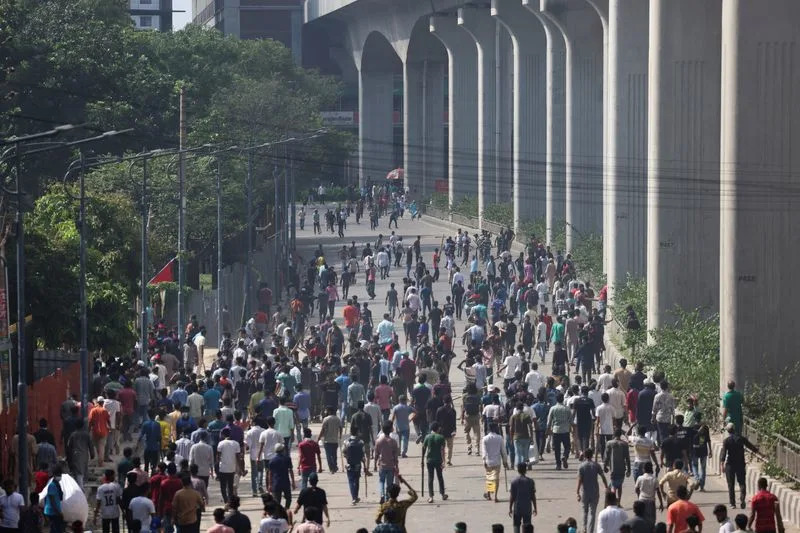
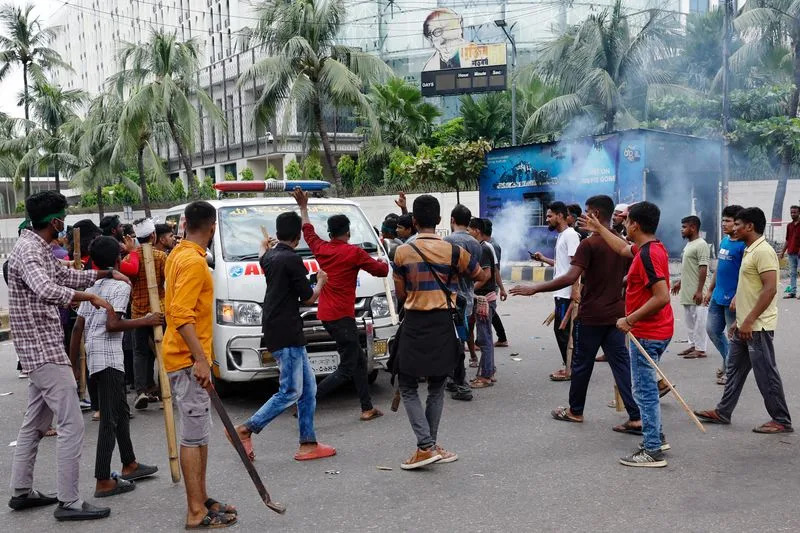

By Ruma Paul
DHAKA (Reuters) -Bangladesh's army chief will address the nation at 2 p.m. (0800 GMT) on Monday, local newspaper Prothom Alo reported, as fresh protests broke out in the troubled South Asian nation for Prime Minister Sheikh Hasina's resignation.
Student activists had called for a march to the capital in defiance of a nationwide curfew to press Hasina to resign, a day after deadly clashes across the country killed nearly 100 people.
As protesters began to march in some places, armoured personnel carriers and troops patrolled the streets of the capital, Reuters TV showed. There was little civilian traffic, barring a few motorcycles and three-wheel taxis.
Police hurled sound grenades in some parts of the city to disperse small groups of protesters, Prothom Alo reported.
Elsewhere, thousands of protesters had surrounded law enforcement officers stationed in front of a key building, it said.
Army chief General Waker-Uz-Zaman would address the people, it said, citing the office of the military spokesperson. "Until then, the public is requested to refrain from violence and be patient," it quoted the spokesperson's office as saying.
Bangladesh has been engulfed by protests and violence that began last month after student groups demanded scrapping of a controversial quota system in government jobs.
That escalated into a campaign to seek the ouster of Hasina, who won a fourth straight term in January in an election boycotted by the opposition.
At least 91 people were killed and hundreds injured on Sunday in a wave of violence across the country of 170 million people as police fired tear gas and rubber bullets to disperse tens of thousands of protesters.
Starting Sunday evening, a nationwide curfew has been imposed, the railways have suspended services and the country's huge garments industry has closed.
(Reporting by Ruma Paul and Sudipto Ganguly; Writing by YP Rajesh; Editing by Raju Gopalakrishnan)



By Ruma Paul
DHAKA (Reuters) -Bangladesh's army chief will address the nation at 2 p.m. (0800 GMT) on Monday, local newspaper Prothom Alo reported, as fresh protests broke out in the troubled South Asian nation for Prime Minister Sheikh Hasina's resignation.
Student activists had called for a march to the capital in defiance of a nationwide curfew to press Hasina to resign, a day after deadly clashes across the country killed nearly 100 people.
As protesters began to march in some places, armoured personnel carriers and troops patrolled the streets of the capital, Reuters TV showed. There was little civilian traffic, barring a few motorcycles and three-wheel taxis.
Police hurled sound grenades in some parts of the city to disperse small groups of protesters, Prothom Alo reported.
Elsewhere, thousands of protesters had surrounded law enforcement officers stationed in front of a key building, it said.
Army chief General Waker-Uz-Zaman would address the people, it said, citing the office of the military spokesperson. "Until then, the public is requested to refrain from violence and be patient," it quoted the spokesperson's office as saying.
Bangladesh has been engulfed by protests and violence that began last month after student groups demanded scrapping of a controversial quota system in government jobs.
That escalated into a campaign to seek the ouster of Hasina, who won a fourth straight term in January in an election boycotted by the opposition.
At least 91 people were killed and hundreds injured on Sunday in a wave of violence across the country of 170 million people as police fired tear gas and rubber bullets to disperse tens of thousands of protesters.
Starting Sunday evening, a nationwide curfew has been imposed, the railways have suspended services and the country's huge garments industry has closed.
(Reporting by Ruma Paul and Sudipto Ganguly; Writing by YP Rajesh; Editing by Raju Gopalakrishnan)
Bangladesh clashes: 90 killed in anti-government protests
Anbarasan Ethirajan - BBC News
Sun, August 4, 2024

[Getty Images]
At least 90 people were killed in Bangladesh on Sunday, amid worsening clashes between police and anti-government protesters.
The unrest comes as student leaders have declared a campaign of civil disobedience to demand that Prime Minister Sheikh Hasina step down.
Thirteen police officers were killed when thousands of people attacked a police station in the district of Sirajganj, police said.
The student protest started with a demand to abolish quotas in civil service jobs last month, but has now turned into a wider anti-government movement.

Protesters blocked a motorway in Bangladesh's capital city [Getty Images]
Both police and some supporters of the governing party were seen shooting at anti-government protesters with live ammunition. Police also used tear gas and rubber bullets.
The total death toll since the protest movement began in July now stands at over 280.
A nationwide overnight curfew has been in place since 18:00 (12:00 GMT).
The UN's human rights chief, Volker Türk, called for an end to the "shocking violence" and urged restraint from Bangladeshi politicians and security forces.
He expressed particular concern over a mass march planned in Dhaka on Monday, warning of a risk of "further loss of life and wider destruction".
"The government must cease targeting those participating peacefully in the protest movement, immediately release those arbitrarily detained, restore full internet access, and create conditions for meaningful dialogue," Mr Turk added.
The continuing effort to suppress popular discontent, including through the excessive use of force, and the deliberate spread of misinformation and incitement to violence, must immediately cease," Mr Türk added.
Amid calls for her resignation, Ms Hasina sounded defiant. Speaking after a meeting with security chiefs, she said the protesters were "not students but terrorists who are out to destabilise the nation".
On Sunday, Law and Justice Minister Anisul Huq told the BBC’s Newshour programme that authorities were showing “restraint”.
“If we had not shown restraint, there would have been a bloodbath. I guess our patience has limits,” he added.
In the capital, Dhaka, access to internet on mobile devices has been suspended.
Deaths and injuries have been reported across the country, including the northern districts of Bogra, Pabna and Rangpur.
Thousands of people gathered in a main square in Dhaka and there have been violent incidents in other parts of the city.
“The whole city has turned into a battleground,” a policeman, who asked not to be named, told the AFP news agency. He said a crowd of several thousand protesters had set fire to cars and motorcycles outside a hospital.
Asif Mahmud, a leading figure in the nationwide civil disobedience campaign, called on protesters to march on Dhaka on Monday.
"The time has come for the final protest", he said.
Students Against Discrimination, a group behind the anti-government demonstrations, urged people not to pay taxes or any utility bills.
The students have also called for a shutdown of all factories and public transport.

Some of the wounded were driven away by protesters [Getty Images]
Around 10,000 people have been reportedly detained in a major crackdown by security forces in the past two weeks. Those arrested included opposition supporters and students.
Some ex-military personnel have expressed support for the student movement, including ex-army chief General Karim Bhuiyan, who told journalists: “We call on the incumbent government to withdraw the armed forces from the street immediately.
He and other ex-military personnel condemned "egregious killings, torture, disappearances and mass arrests".
The next few days are seen as crucial for both camps.
The protests pose a momentous challenge to Ms Hasina, who was elected for a fourth consecutive term in January elections, boycotted by the main opposition.
Students took to the streets last month over a quota that reserved one third of civil service jobs for relatives of the veterans of Bangladesh’s independence war with Pakistan in 1971.
Most of the quota has now been scaled back by the government following a government ruling, but students have continued to protest, demanding justice for those killed and injured. Now they want Ms Hasina to step down.
Supporters of Ms Hasina have ruled out her resignation.
Earlier, Ms Hasina offered unconditional dialogue with the student leaders, saying she wanted the violence to end.
“I want to sit with the agitating students of the movement and listen to them. I want no conflict," she said.
But the student protesters have rejected her offer.
Ms Hasina called in the military last month to restore order after several police stations and state buildings were set on fire during the protests.
The Bangladeshi army chief, Gen Waker-Uz-Zaman, held a meeting with junior officers in Dhaka to assess the security situation.
“The Bangladesh army has always stood by the people and will continue to do so for the interest of people and in any need of the state," Gen Zaman said, according to a release by the Inter Services Public Relation Directorate.
Bangladeshi media say most of those killed in last month’s protests were shot dead by police. Thousands were injured.
The government argues that police opened fire only in self-defence and to protect state properties.
Nearly 100 killed as renewed anti-government protests rock Bangladesh
DPA
Sun, August 4, 2024 at 10:26 AM MDT·4 min read

Thousands of students take part in a protest to demand justice for the victims killed in the recent countrywide anti-quota protests. Anti-discrimination student movement calls for resignation of Bangladesh's Prime Minister Sheikh Hasina. Joy Saha/ZUMA Press Wire/d
Authorities in Bangladesh have tightened a nationwide curfew after nearly 100 people, including 14 police officers, were reportedly killed in a wave of violence on Sunday.
The clashes came a day after protesters called for nationwide "civil disobedience" to demand the ouster of Prime Minister Sheikh Hasina's government.
"The curfew will remain effective until further direction from 6 pm (1200 GMT) at all cities, divisional and district headquarters, municipal areas, industrial zones and towns across Bangladesh," an order issued by the Ministry of Home Affairs said.
The government first imposed a curfew on July 19, as student-led protests against government job quotas turned deadly. A government crackdown quelled the violence and the curfew had been relaxed in recent days.
But the eruption of unrest at the weekend led to the new curfew order on Sunday, as well as the declaration of a three-day public holiday from Monday.
The Daily Star newspaper reported at least 90 people were killed in clashes across the country among anti-government protesters, police and supporters of Hasina's Awami League party.
Another newspaper, the Prothom Alo, put the death toll at 99.
The figures could not be independently verified by dpa. The dailies reported that numerous others were injured.
At least 13 police officers were killed when protesters attacked a police station in northern Sirajganj district on Sunday.
Dhaka's police headquarter said in a press statement that a "terrorist attack" was carried out on the Enayetpur Police Station, leaving 13 officers dead in that confrontation.
In the eastern Narsingdhi district near Dhaka, six senior members of the ruling Awami League party were beaten to death in a clash near the Madhavadhi Municipal Building, said police officer Shahidul Islam Shohag.
Four people were killed during the clashes in various neighbourhoods in the capital Dhaka, police officer Bachhu Mia said while at the state-run Dhaka Medical College Hospital.
A local leader of the opposition Bangladesh Nationalist Party's (BNP) student wing in the south-western district of Magura was shot dead during a clash with police, local BNP leader Mizanur Rahman said.
He said more than 30 people were injured in the fighting in Magura, located nearly 200 kilometres south-west of Dhaka.
After days of relative calm, the violence flared anew after Saturday's call to civil disobedience by student leaders.
The government had given in to the students' demands to reform an unpopular job quota system, after the protests in mid-July left more than 200 people dead.
Student protesters have accused law enforcement of using indiscriminate violence against them and are now demanding accountability.
The protesters are asking the government to ensure justice for the victims of police atrocities, a lifting of the curfew and the reopening of educational institutions.
But on Saturday they went further, demanding the government's resignation and launching the civil disobedience call.
Protest organizers told people not to pay taxes and utility bills and to keep offices, factories and public transport shuttered.
In response to the call, thousands of stick-wielding protesters took to the streets in Dhaka and other parts of the country.
An estimated 5,000 protesters gathered at central Shahbagh crossing near Dhaka University, where they clashed with supporters of the ruling party in the morning, a witness said.
The protesters attacked a nearby hospital, set fire to vehicles parked at the hospital and to the office of a local city councillor.
Most businesses and public offices were shut and few vehicles were about on the first day of the civil disobedience. Police in riot gear and troops from the paramilitary Border Guard were seen deployed at many strategic points.
Meanwhile, the authorities asked telecom operators to suspend social media platforms such as Facebook, Messenger, WhatsApp and Instagram, the daily Prothom Alo reported.
On Sunday afternoon, the Anti-discrimination Student Movement announced fresh nationwide actions for Monday.
Nahid Islam, one of the movement's coordinators, in a press statement said that the rallies by workers to be held in Dhaka on Monday will be followed by a "Long March to Dhaka" by protesters from different parts of the country.
State Minister for Information and Broadcasting Ali Arafat accused the opposition Bangladesh Nationalist Party and recently banned rightwing Bangladesh Jamaat-e-Islami Party for engaging the students in "terrorist activities."
"Law will take its own course if anyone is engaged in terrorism," he said, adding that the people in general do not support the acts of sabotage.
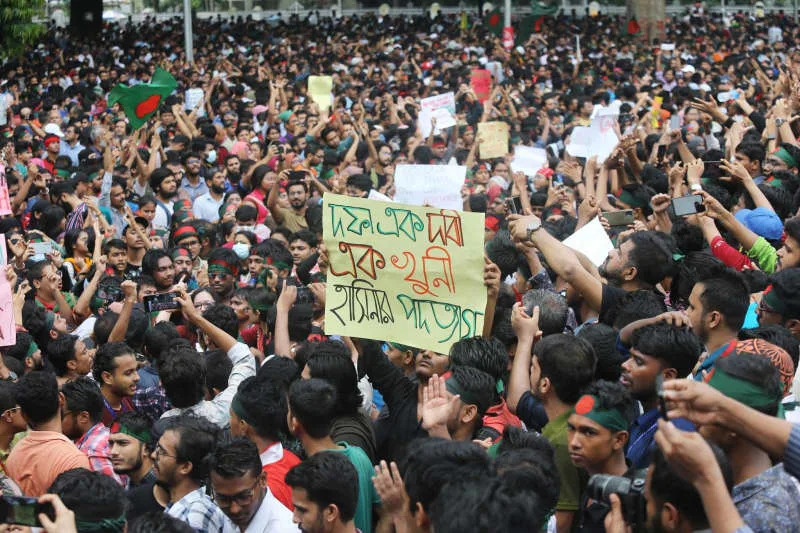
Anti-Discrimination Student Movement take part in a rally at Central Shaheed Minar to demand justice for the victims killed in the recent countrywide anti-quota protests. Habibur Rahman/ZUMA Press Wire/dpa

Anti-Discrimination Student Movement take part in a rally at Central Shaheed Minar to demand justice for the victims killed in the recent countrywide anti-quota protests. Habibur Rahman/ZUMA Press Wire/dpa
Anbarasan Ethirajan - BBC News
Sun, August 4, 2024

[Getty Images]
At least 90 people were killed in Bangladesh on Sunday, amid worsening clashes between police and anti-government protesters.
The unrest comes as student leaders have declared a campaign of civil disobedience to demand that Prime Minister Sheikh Hasina step down.
Thirteen police officers were killed when thousands of people attacked a police station in the district of Sirajganj, police said.
The student protest started with a demand to abolish quotas in civil service jobs last month, but has now turned into a wider anti-government movement.

Protesters blocked a motorway in Bangladesh's capital city [Getty Images]
Both police and some supporters of the governing party were seen shooting at anti-government protesters with live ammunition. Police also used tear gas and rubber bullets.
The total death toll since the protest movement began in July now stands at over 280.
A nationwide overnight curfew has been in place since 18:00 (12:00 GMT).
The UN's human rights chief, Volker Türk, called for an end to the "shocking violence" and urged restraint from Bangladeshi politicians and security forces.
He expressed particular concern over a mass march planned in Dhaka on Monday, warning of a risk of "further loss of life and wider destruction".
"The government must cease targeting those participating peacefully in the protest movement, immediately release those arbitrarily detained, restore full internet access, and create conditions for meaningful dialogue," Mr Turk added.
The continuing effort to suppress popular discontent, including through the excessive use of force, and the deliberate spread of misinformation and incitement to violence, must immediately cease," Mr Türk added.
Amid calls for her resignation, Ms Hasina sounded defiant. Speaking after a meeting with security chiefs, she said the protesters were "not students but terrorists who are out to destabilise the nation".
On Sunday, Law and Justice Minister Anisul Huq told the BBC’s Newshour programme that authorities were showing “restraint”.
“If we had not shown restraint, there would have been a bloodbath. I guess our patience has limits,” he added.
In the capital, Dhaka, access to internet on mobile devices has been suspended.
Deaths and injuries have been reported across the country, including the northern districts of Bogra, Pabna and Rangpur.
Thousands of people gathered in a main square in Dhaka and there have been violent incidents in other parts of the city.
“The whole city has turned into a battleground,” a policeman, who asked not to be named, told the AFP news agency. He said a crowd of several thousand protesters had set fire to cars and motorcycles outside a hospital.
Asif Mahmud, a leading figure in the nationwide civil disobedience campaign, called on protesters to march on Dhaka on Monday.
"The time has come for the final protest", he said.
Students Against Discrimination, a group behind the anti-government demonstrations, urged people not to pay taxes or any utility bills.
The students have also called for a shutdown of all factories and public transport.

Some of the wounded were driven away by protesters [Getty Images]
Around 10,000 people have been reportedly detained in a major crackdown by security forces in the past two weeks. Those arrested included opposition supporters and students.
Some ex-military personnel have expressed support for the student movement, including ex-army chief General Karim Bhuiyan, who told journalists: “We call on the incumbent government to withdraw the armed forces from the street immediately.
He and other ex-military personnel condemned "egregious killings, torture, disappearances and mass arrests".
The next few days are seen as crucial for both camps.
The protests pose a momentous challenge to Ms Hasina, who was elected for a fourth consecutive term in January elections, boycotted by the main opposition.
Students took to the streets last month over a quota that reserved one third of civil service jobs for relatives of the veterans of Bangladesh’s independence war with Pakistan in 1971.
Most of the quota has now been scaled back by the government following a government ruling, but students have continued to protest, demanding justice for those killed and injured. Now they want Ms Hasina to step down.
Supporters of Ms Hasina have ruled out her resignation.
Earlier, Ms Hasina offered unconditional dialogue with the student leaders, saying she wanted the violence to end.
“I want to sit with the agitating students of the movement and listen to them. I want no conflict," she said.
But the student protesters have rejected her offer.
Ms Hasina called in the military last month to restore order after several police stations and state buildings were set on fire during the protests.
The Bangladeshi army chief, Gen Waker-Uz-Zaman, held a meeting with junior officers in Dhaka to assess the security situation.
“The Bangladesh army has always stood by the people and will continue to do so for the interest of people and in any need of the state," Gen Zaman said, according to a release by the Inter Services Public Relation Directorate.
Bangladeshi media say most of those killed in last month’s protests were shot dead by police. Thousands were injured.
The government argues that police opened fire only in self-defence and to protect state properties.
Nearly 100 killed as renewed anti-government protests rock Bangladesh
DPA
Sun, August 4, 2024 at 10:26 AM MDT·4 min read

Thousands of students take part in a protest to demand justice for the victims killed in the recent countrywide anti-quota protests. Anti-discrimination student movement calls for resignation of Bangladesh's Prime Minister Sheikh Hasina. Joy Saha/ZUMA Press Wire/d
Authorities in Bangladesh have tightened a nationwide curfew after nearly 100 people, including 14 police officers, were reportedly killed in a wave of violence on Sunday.
The clashes came a day after protesters called for nationwide "civil disobedience" to demand the ouster of Prime Minister Sheikh Hasina's government.
"The curfew will remain effective until further direction from 6 pm (1200 GMT) at all cities, divisional and district headquarters, municipal areas, industrial zones and towns across Bangladesh," an order issued by the Ministry of Home Affairs said.
The government first imposed a curfew on July 19, as student-led protests against government job quotas turned deadly. A government crackdown quelled the violence and the curfew had been relaxed in recent days.
But the eruption of unrest at the weekend led to the new curfew order on Sunday, as well as the declaration of a three-day public holiday from Monday.
The Daily Star newspaper reported at least 90 people were killed in clashes across the country among anti-government protesters, police and supporters of Hasina's Awami League party.
Another newspaper, the Prothom Alo, put the death toll at 99.
The figures could not be independently verified by dpa. The dailies reported that numerous others were injured.
At least 13 police officers were killed when protesters attacked a police station in northern Sirajganj district on Sunday.
Dhaka's police headquarter said in a press statement that a "terrorist attack" was carried out on the Enayetpur Police Station, leaving 13 officers dead in that confrontation.
In the eastern Narsingdhi district near Dhaka, six senior members of the ruling Awami League party were beaten to death in a clash near the Madhavadhi Municipal Building, said police officer Shahidul Islam Shohag.
Four people were killed during the clashes in various neighbourhoods in the capital Dhaka, police officer Bachhu Mia said while at the state-run Dhaka Medical College Hospital.
A local leader of the opposition Bangladesh Nationalist Party's (BNP) student wing in the south-western district of Magura was shot dead during a clash with police, local BNP leader Mizanur Rahman said.
He said more than 30 people were injured in the fighting in Magura, located nearly 200 kilometres south-west of Dhaka.
After days of relative calm, the violence flared anew after Saturday's call to civil disobedience by student leaders.
The government had given in to the students' demands to reform an unpopular job quota system, after the protests in mid-July left more than 200 people dead.
Student protesters have accused law enforcement of using indiscriminate violence against them and are now demanding accountability.
The protesters are asking the government to ensure justice for the victims of police atrocities, a lifting of the curfew and the reopening of educational institutions.
But on Saturday they went further, demanding the government's resignation and launching the civil disobedience call.
Protest organizers told people not to pay taxes and utility bills and to keep offices, factories and public transport shuttered.
In response to the call, thousands of stick-wielding protesters took to the streets in Dhaka and other parts of the country.
An estimated 5,000 protesters gathered at central Shahbagh crossing near Dhaka University, where they clashed with supporters of the ruling party in the morning, a witness said.
The protesters attacked a nearby hospital, set fire to vehicles parked at the hospital and to the office of a local city councillor.
Most businesses and public offices were shut and few vehicles were about on the first day of the civil disobedience. Police in riot gear and troops from the paramilitary Border Guard were seen deployed at many strategic points.
Meanwhile, the authorities asked telecom operators to suspend social media platforms such as Facebook, Messenger, WhatsApp and Instagram, the daily Prothom Alo reported.
On Sunday afternoon, the Anti-discrimination Student Movement announced fresh nationwide actions for Monday.
Nahid Islam, one of the movement's coordinators, in a press statement said that the rallies by workers to be held in Dhaka on Monday will be followed by a "Long March to Dhaka" by protesters from different parts of the country.
State Minister for Information and Broadcasting Ali Arafat accused the opposition Bangladesh Nationalist Party and recently banned rightwing Bangladesh Jamaat-e-Islami Party for engaging the students in "terrorist activities."
"Law will take its own course if anyone is engaged in terrorism," he said, adding that the people in general do not support the acts of sabotage.

Anti-Discrimination Student Movement take part in a rally at Central Shaheed Minar to demand justice for the victims killed in the recent countrywide anti-quota protests. Habibur Rahman/ZUMA Press Wire/dpa

Anti-Discrimination Student Movement take part in a rally at Central Shaheed Minar to demand justice for the victims killed in the recent countrywide anti-quota protests. Habibur Rahman/ZUMA Press Wire/dpa
Shafiqul ALAM
Sun, 4 August 2024
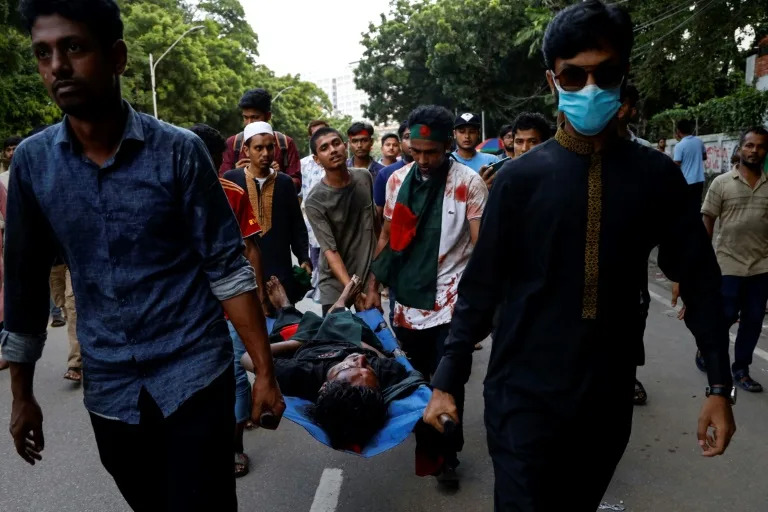
Demonstrations began over the reintroduction of a civil service job quota scheme but have morphed into demands the premier quit (Mahmud Zaman Ovi)
Bangladeshi security forces patrolled the capital on Monday as protesters demanding Prime Minister Sheikh Hasina's resignation said they would take to Dhaka's streets again following the deadliest day of unrest since demonstrations erupted last month.
Analysts fear violence could surpass that seen on Sunday, when hundreds of thousands of protesters and government supporters countrywide battled each other with sticks and knives, and security forces opened fire with rifles.
Soldiers and police in Dhaka barricaded routes to Hasina's office with barbed wire in a bid to enforce a curfew that came into effect Sunday evening, AFP reporters said.
Mobile internet was tightly restricted countrywide, offices were closed and the country's more than 3,500 economically vital garment factories were shut.
Rallies that began last month against civil service job quotas have escalated into some of the worst unrest of Hasina's 15-year rule and shifted into wider calls for the 76-year-old to quit.
"We are calling on students and the public all over the country to march towards Dhaka," said Asif Mahmud, one of the key leaders in the nationwide civil disobedience campaign.
"The time has come for the final protest," he added.
- 'Shocking violence' -
At least 94 people died on Sunday, including 14 police officers, many of whom were killed when protesters stormed a station in the northeastern town of Enayetpur.
The day's violence took the total number of people killed since protests began in early July to at least 300, according to an AFP tally based on police, government officials and doctors at hospitals.
"The shocking violence in Bangladesh must stop," United Nations rights chief Volker Turk said in a statement.
Ali Riaz, an Illinois State University politics professor and expert on Bangladesh, warned that Hasina was "digging her heels" in, adding he was "deeply concerned" at the crisis.
"This is an unprecedented popular uprising by all measures," Riaz said. "Also, the ferocity of the state actors and regime loyalists is unmatched in history."
Protesters in Dhaka were seen climbing a statue of Hasina's father Sheikh Mujibur Rahman, the country's independence leader, and smashing it with hammers, according to videos on social media verified by AFP.
- 'Raw anger' -
In several cases, soldiers and police did not intervene to stem the protests Sunday, unlike during the past month of rallies that repeatedly ended in deadly crackdowns.
Demonstrators in Dhaka, surrounded by a tightly packed and cheering crowd, waved a Bangladeshi flag on top of an armoured car as soldiers watched, according to videos verified by AFP.
"Let's be clear: The walls are closing in on Hasina: She's rapidly losing support and legitimacy," Michael Kugelman, director of the South Asia Institute at the Washington-based Wilson Center, told AFP.
"The protests have taken on immense momentum, fuelled by raw anger but also by the confidence that comes with knowing that so much of the nation is behind them."
In a hugely symbolic rebuke of Hasina, a respected former army chief demanded the government "immediately" withdraw troops and allow protests.
"Those who are responsible for pushing people of this country to a state of such an extreme misery will have to be brought to justice," ex-army chief General Ikbal Karim Bhuiyan told reporters Sunday, in a joint statement alongside other senior former officers.
- 'By the people' -
Current army chief Waker-uz-Zaman told officers on Saturday that the military "always stood by the people", according to an official statement, which gave no further details and did not say explicitly whether the army backed the protests.
The anti-government movement has attracted people from across society in the South Asian nation of about 170 million people, including film stars, musicians and singers.
Hasina has ruled Bangladesh since 2009 and won her fourth consecutive election in January after a vote without genuine opposition.
Her government is accused by rights groups of misusing state institutions to entrench its hold on power and stamp out dissent, including through the extrajudicial killing of opposition activists.
Demonstrations began over the reintroduction of a quota scheme that reserved more than half of all government jobs for certain groups.
The protests have continued despite the scheme having been scaled back by Bangladesh's top court.
sa/pjm/smw
Bangladesh students step up protests to press PM's resignation
Shafiqul ALAM
Sat, 3 August 2024
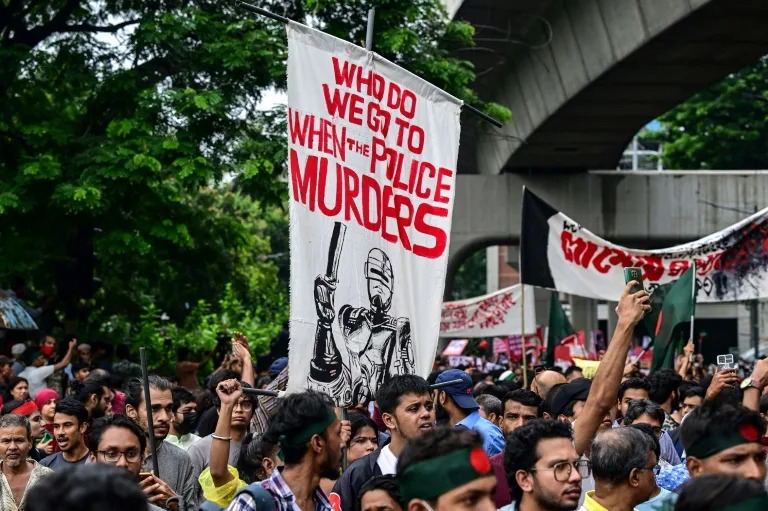
Activists marching in Dhaka to call for justice for those killed in the recent countrywide violence (Munir UZ ZAMAN)
Bangladeshi student leaders on Saturday said they would carry on a planned nationwide civil disobedience campaign until Prime Minister Sheikh Hasina resigned following last month's deadly police crackdown on protesters.
Rallies against civil service job quotas sparked days of mayhem in July that killed more than 200 people in some of the worst unrest of Hasina's 15-year tenure.
Troop deployments briefly restored order but crowds returned to the streets in huge numbers this week ahead of an all-out non-cooperation movement aimed at paralysing the government planned to begin on Sunday.
Students Against Discrimination, the group responsible for organising the initial protests, rebuffed an offer of talks with Hasina earlier in the day before announcing their campaign would continue until the premier and her government step down.
"She must resign and she must face trial," Nahid Islam, the group's leader, told a crowd of thousands at a monument to national heroes in the capital Dhaka to roars of approval.
Students Against Discrimination have asked their compatriots to cease paying taxes and utility bills from Sunday to pile pressure on the government.
They have also asked government workers and labourers in the country's economically vital garment factories to strike.
"She must go because we don't need this authoritarian government," Nijhum Yasmin, 20, told AFP from one of many protests staged around Dhaka on Saturday.
"Did we liberate the country to see our brothers and sisters shot dead by this regime?"
The looming non-cooperation campaign deliberately evokes a historical civil disobedience campaign during Bangladesh's 1971 liberation war against Pakistan.
That earlier movement was spearheaded by Hasina's father Sheikh Mujibur Rahman, the country's independence leader, and is remembered by Bangladeshis as a part of a proud battle against tyranny.
"Now the tables have turned," Illinois State University politics professor Ali Riaz told AFP.
"The regime's foundation has been shaken, the aura of invincibility has disappeared," he added. "The question is whether Hasina is ready to look for an exit or fight to the last."
- 32 children killed -
Hasina, 76, has ruled Bangladesh since 2009 and won her fourth consecutive election in January after a vote without genuine opposition.
Her government is accused by rights groups of misusing state institutions to entrench its hold on power and stamp out dissent, including the extrajudicial killing of opposition activists.
Demonstrations began in early July over the reintroduction of a quota scheme -- since scaled back by Bangladesh's top court -- that reserved more than half of all government jobs for certain groups.
With around 18 million young Bangladeshis out of work, according to government figures, the move upset graduates facing an acute employment crisis.
The protests had remained largely peaceful until attacks on demonstrators by police and pro-government student groups.
Hasina's government eventually imposed a nationwide curfew, deployed troops and shut down the nation's mobile internet network for 11 days to restore order.
But the clampdown provoked a torrent of criticism from abroad and failed to quell widespread rancour at home.
Crowds returned to the streets in huge numbers after Friday prayers in the Muslim-majority nation, heeding a call by student leaders to press the government for more concessions.
European Union foreign policy chief Josep Borrell this week called for an international probe into the "excessive and lethal force against protesters".
Home Minister Asaduzzaman Khan told reporters last weekend that security forces had operated with restraint but were "forced to open fire" to defend government buildings.
At least 32 children were among those killed last month, the United Nations said Friday.
sa/gle/tym
Death toll in Bangladesh anti-government protests rises to at least 300
FRANCE 24
Sun, 4 August 2024

Death toll in Bangladesh anti-government protests rises to at least 300
A mass protest Sunday in Bangladesh against Prime Minister Sheikh Hasina left more than 90 people dead as demonstrators clashed with government supporters. At least 300 people have died since protests started in early July over a government job-quota scheme, which has since been scaled back by the country’s Supreme Court.
The overall death toll from clashes in Bangladesh has risen to at least 300 people, after 94 died Sunday in the deadliest day in weeks of anti-government demonstrations, according to an AFP tally.
The tally is based on reports from police, officials and doctors at hospitals. Protests are set to resume on Monday, with heavy deployments of soldiers and police in the capital Dhaka patrolling key roads and barricading routes to the prime minister's office.
Hundreds of thousands of Bangladeshi protesters demanding Hasina resign clashed with government supporters Sunday in one of the deadliest days since demonstrations began in July.
Rallies that began last month against civil service job quotas have escalated into some of the worst unrest of Hasina's 15-year rule and shifted into wider calls for the 76-year-old to step down.
Anti-government protesters in Bangladesh plan to march to capital after a weekend of deadly clashes
JULHAS ALAM
Sun, 4 August 2024
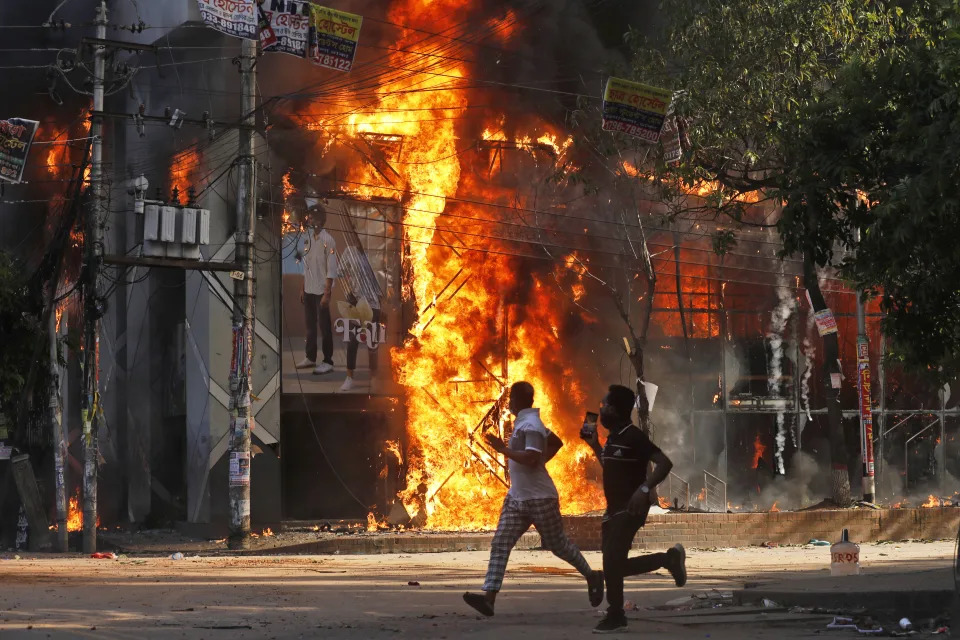

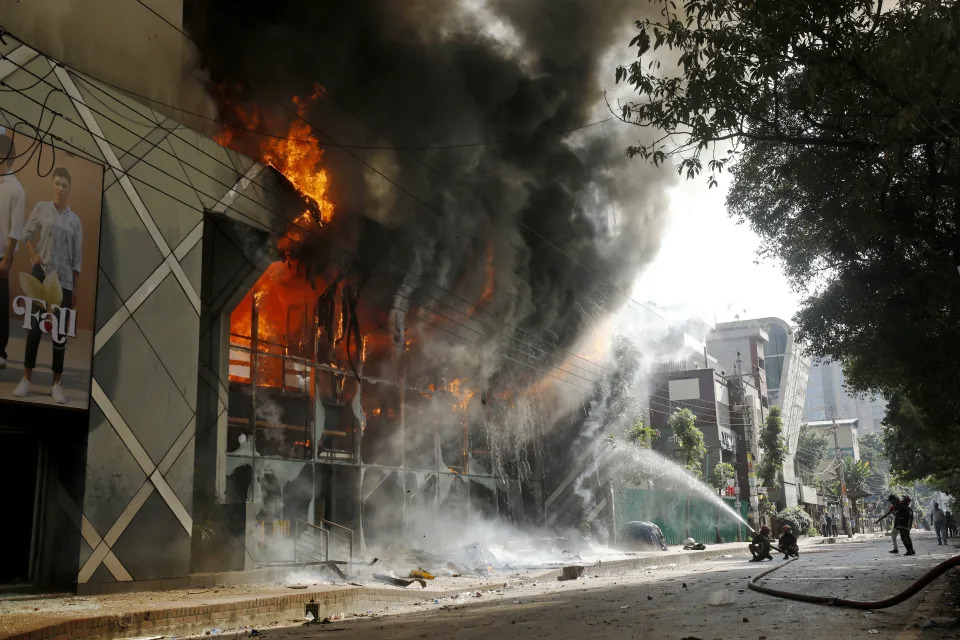

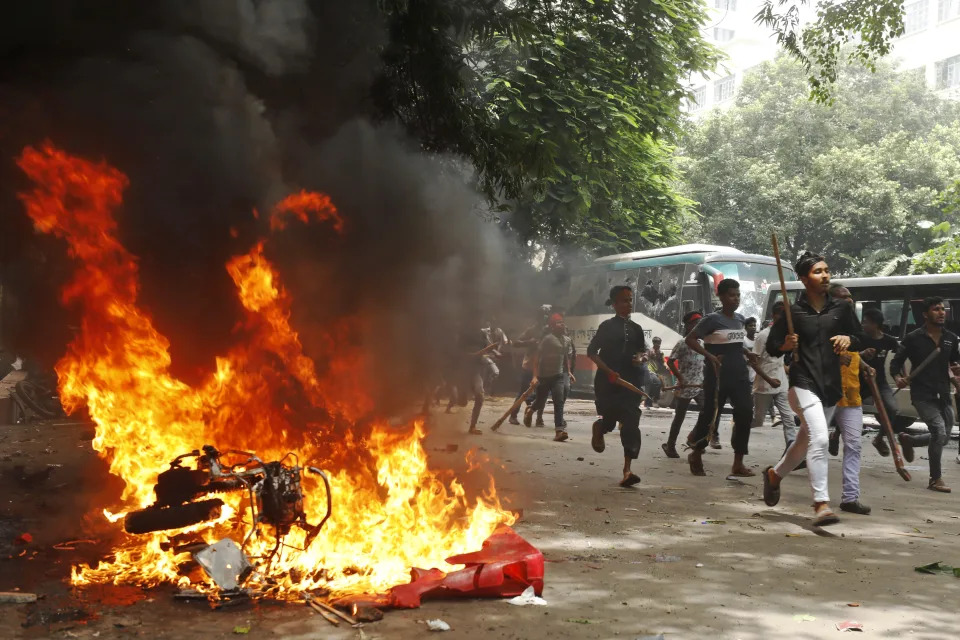

Men run past a shopping center which was set on fire by protesters during a rally against Prime Minister Sheikh Hasina and her government demanding justice for the victims killed in the recent countrywide deadly clashes, in Dhaka, Bangladesh, Sunday, Aug. 4, 2024.
(AP Photo/Rajib Dhar)
DHAKA, Bangladesh (AP) — Anti-government protesters across Bangladesh planned to march to the capital, Dhaka, on Monday after a weekend of violence that left dozens of people dead, as the military imposed a curfew for an indefinite period and authorities cut off mobile internet in an attempt to stem the unrest.
At least 95 people, including at least 14 police officers, died in clashes in the capital on Sunday, according to the country's leading Bengali-language daily newspaper, Prothom Alo. Hundreds more were injured in the violence.
The demonstrations began with students seeking to end a quota system for government jobs, but clashes with police and pro-government activists escalated into violence that left more than 200 dead. That prompted protest and opposition leaders to call for Prime Minister Sheikh Hasina to resign in widening protests across the country.
The military-imposed curfew went into effect Sunday night and covered Dhaka and other divisional and district headquarters. The government had earlier imposed a curfew with some exceptions in the capital and elsewhere.
The government also announced a holiday from Monday to Wednesday. Courts were to be closed indefinitely. Mobile internet service was cut off, and Facebook and messaging apps, including WhatsApp, were inaccessible.
Hasina said the protesters who engaged in “sabotage” and destruction were no longer students but criminals, and she said the people should deal with them with iron hands.
The prime minister's ruling Awami League party said the demand for her resignation showed that the protests have been taken over by the main opposition Bangladesh Nationalist Party and the now-banned Jamaat-e-Islami party.
At least 11,000 people have been arrested in recent weeks. The unrest has also resulted in the closure of schools and universities across the country, and authorities at one point imposed a shoot-on-sight curfew.
Over the weekend, protesters called for a “non-cooperation” effort, urging people not to pay taxes or utility bills and not to show up for work on Sunday, a working day in Bangladesh. Offices, banks and factories opened, but commuters in Dhaka and other cities faced challenges getting to their jobs.
The protests began last month as students demanded an end to a quota system that reserved 30% of government jobs for the families of veterans who fought in Bangladesh’s war of independence against Pakistan in 1971.
As the violence crested, the country's Supreme Court ruled that the veterans’ quota must be cut to 5%, with 93% of jobs to be allocated on merit. The remaining 2% will be set aside for members of ethnic minorities and transgender and disabled people. The government accepted the decision, but protesters have continued demanding accountability for the violence they blame on the government's use of force.
Hasina's administration has blamed the opposition parties and their student wings for instigating the violence in which several state-owned establishments were also torched or vandalized.
Mirza Fakhrul Islam Alamgir, secretary-general of the main opposition party, repeated a call for the government to step down to stop the chaos.
Hasina offered to talk with student leaders on Saturday, but a coordinator refused and announced a one-point demand for her resignation. Hasina repeated her pledges to investigate the deaths and punish those responsible for the violence. She said she was ready to sit down whenever the protesters want.
The protests have become a major challenge for Hasina, who has ruled the country for over 15 years. She returned to power for a fourth consecutive term in January in an election that was boycotted by her main opponents.
DHAKA, Bangladesh (AP) — Anti-government protesters across Bangladesh planned to march to the capital, Dhaka, on Monday after a weekend of violence that left dozens of people dead, as the military imposed a curfew for an indefinite period and authorities cut off mobile internet in an attempt to stem the unrest.
At least 95 people, including at least 14 police officers, died in clashes in the capital on Sunday, according to the country's leading Bengali-language daily newspaper, Prothom Alo. Hundreds more were injured in the violence.
The demonstrations began with students seeking to end a quota system for government jobs, but clashes with police and pro-government activists escalated into violence that left more than 200 dead. That prompted protest and opposition leaders to call for Prime Minister Sheikh Hasina to resign in widening protests across the country.
The military-imposed curfew went into effect Sunday night and covered Dhaka and other divisional and district headquarters. The government had earlier imposed a curfew with some exceptions in the capital and elsewhere.
The government also announced a holiday from Monday to Wednesday. Courts were to be closed indefinitely. Mobile internet service was cut off, and Facebook and messaging apps, including WhatsApp, were inaccessible.
Hasina said the protesters who engaged in “sabotage” and destruction were no longer students but criminals, and she said the people should deal with them with iron hands.
The prime minister's ruling Awami League party said the demand for her resignation showed that the protests have been taken over by the main opposition Bangladesh Nationalist Party and the now-banned Jamaat-e-Islami party.
At least 11,000 people have been arrested in recent weeks. The unrest has also resulted in the closure of schools and universities across the country, and authorities at one point imposed a shoot-on-sight curfew.
Over the weekend, protesters called for a “non-cooperation” effort, urging people not to pay taxes or utility bills and not to show up for work on Sunday, a working day in Bangladesh. Offices, banks and factories opened, but commuters in Dhaka and other cities faced challenges getting to their jobs.
The protests began last month as students demanded an end to a quota system that reserved 30% of government jobs for the families of veterans who fought in Bangladesh’s war of independence against Pakistan in 1971.
As the violence crested, the country's Supreme Court ruled that the veterans’ quota must be cut to 5%, with 93% of jobs to be allocated on merit. The remaining 2% will be set aside for members of ethnic minorities and transgender and disabled people. The government accepted the decision, but protesters have continued demanding accountability for the violence they blame on the government's use of force.
Hasina's administration has blamed the opposition parties and their student wings for instigating the violence in which several state-owned establishments were also torched or vandalized.
Mirza Fakhrul Islam Alamgir, secretary-general of the main opposition party, repeated a call for the government to step down to stop the chaos.
Hasina offered to talk with student leaders on Saturday, but a coordinator refused and announced a one-point demand for her resignation. Hasina repeated her pledges to investigate the deaths and punish those responsible for the violence. She said she was ready to sit down whenever the protesters want.
The protests have become a major challenge for Hasina, who has ruled the country for over 15 years. She returned to power for a fourth consecutive term in January in an election that was boycotted by her main opponents.


